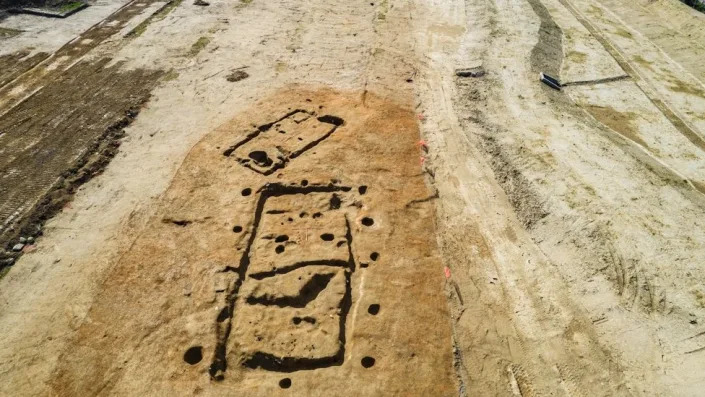
David Wilson - BBC News NI
Sun, February 5, 2023
The discovery of a Neolithic era settlement is helping shed new light on how people lived on the shores of Lough Foyle some 5,000 years ago.
Archaeologists uncovered evidence of two large rectangular houses dating back to around 3,800BC during a 2021 dig at Clooney Road, Londonderry.
Neolithic tools, pottery and cooking utensils have also been unearthed.
Experts say that dwellings like those found in Derry have rarely been excavated before.
Archaeologist Katy McMonagle was the site director on the Clooney Road dig.
The finds feature in the latest series of BBC Two's Digging for Britain.
Rectangular homes from the period are seldom found outside of Scotland and Ireland, Ms McMonagle said.
"Around Lough Foyle specifically there are quite a few - it has a high density of settlement dated to the early Neolithic - that shows around Lough Foyle there are lots and lots of Neolithic people living," she told BBC Radio Foyle's Mark Patterson Show.
Archaeologists seldom have an opportunity to excavate houses of the type found in Derry, she added.
"They were a short-lived phenomenon, that means it is even more exciting," she said.
The 5,000 year-old homes were much bigger than the average house of today.
There is evidence of dividing walls, foundations that may have supported oak planks and structures covered by a large peaked roof.
Circular dwellings - round houses - are more typical of the Neolithic period which occurred between 4,000 and 2,000BC.
It was when people took up agriculture as a way of life and moved away from being nomadic hunter-gatherers.
The Derry settlement, where it is located and the way it is constructed, is evidence of the shift to a more settled way of life, Ms McMonagle said.
"When we were digging it out you could see how amazing it would have looked, how deep the foundations were.
"The soil is good there and they are in a substantial place, with Lough Foyle as a resource, it would have been a beautifully wooded area back in the Neolithic.
"They would have been using that landscape so well."
The tools and utensils found are also evidence of the advances being made in the Neolithic period on the island of Ireland, she said.
'Like a Swiss Army knife'
The team from Northern Archaeology Consultancy, who were called in ahead of the construction of a modern day housing development, found serrated tools used to strip bark - unique to Ireland - and a Plano-convex knife.
The latter artefact, Ms McMonagle said, was used for a "little bit of everything, like a Swiss Army knife". Knives like this were used much earlier on the island of Ireland than elsewhere, she added.
A grinding stone was found, showing the inhabitants knew how to work grain, how to cultivate the land they inhabited.
It is not the first time evidence of Neolithic period settlement has been uncovered on the banks of the Foyle.
A 6,000-year-old village was unearthed in 2000 during an excavation ahead of the construction of Thornhill College's new school in the Culmore area of Derry.
Six thousand year old axe heads, arrowheads and pottery were among the artefacts recovered from a site which archaeologists said could have been home to about 50 of Ireland's earliest farmers.
Post-excavation work is now ongoing on the finds from Clooney Road. It is hoped some of what the team found will go on public display at a future date.
No comments:
Post a Comment